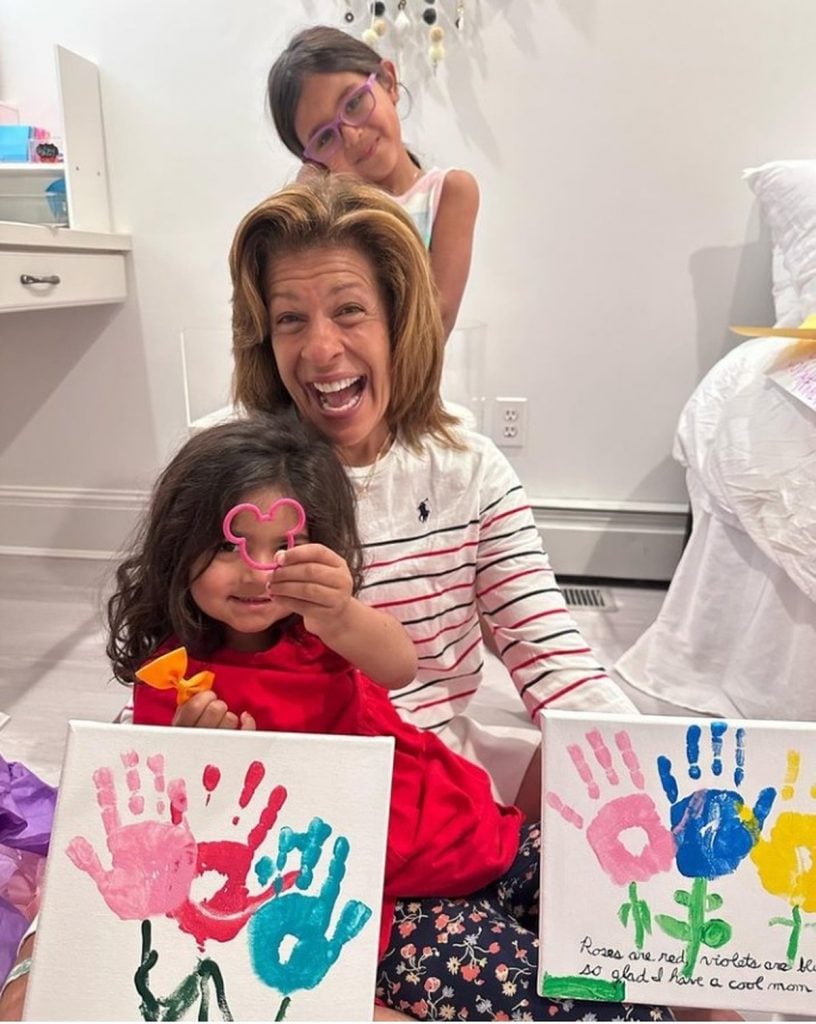Talking To Your Kids After a Diagnosis
- Former “Today Show” host Hoda Kotb, 60, was diagnosed with breast cancer in 2007 and underwent a mastectomy (removal of one of her breasts) followed by reconstructive surgery and tamoxifen (a hormone therapy) to help treat her cancer.
- Kotb’s 8-year-old daughter recently discovered her cancer journey while reading her book, prompting a heartfelt conversation.
- Parents living with cancer are encouraged to be as honest with their children as possible when explaining their condition, using language that they can understand at their age.
- The U.S. Preventive Services Task Force (USPSTF) recommends women get mammograms every other year at the age of 40. The American Cancer Society recommends getting a mammogram every other year for women 55 and older. Talk to your doctor to learn when you should begin mammograms based on your personal risk level.
Kotb was first diagnosed with breast cancer in 2007. She chronicled her experience in her book, never expecting her 8-year-old daughter to stumble upon it while reading.

WATCH: Things to consider when considering a mastectomy.
While some patients experience side effects that mimic menopause, such as hot flashes, Kotb managed her treatment and emerged cancer-free.
“I keep reminding myself: Take it small,” Kotb said of her approach to talking to her daughters about her diagnosis. “Get all the conversations. Know your kids.”

Aside from reliving part of her cancer experience, Kotb says her family life overall is in a good place, which includes her children’s father, Joel Schiffman, with whom she co-parents.
“I was realizing that you can love someone—like I loved him very much, and still do to this day—but that person isn’t right for you in that moment,” Hoda said on an episode of the “Today Show.”
In retrospect, Kotb says, “Cancer shaped me, but it did not define me. It’s part of me, but not all of me.”
Kotb’s story is a reminder of the power of resilience—and the unexpected ways our past can resurface through the eyes of our children.
Talking to Children About Cancer With Honesty & Empathy
When a parent receives a cancer diagnosis, one of the hardest conversations they may face is explaining it to their children. It’s a delicate balance—being honest about what’s ahead while protecting their emotional well-being.
There’s no one-size-fits-all approach, as widower John Duberstein shared in an interview with SurvivorNet. Before his wife Nina passed away from breast cancer, the couple made the intentional choice to talk openly with their children about her illness.
“I think it’s really important to be open with the kids as much as you can, as much as you feel like they can handle,” Duberstein said.
WATCH: Talking to kids about cancer.
As Nina’s appearance began to change—looking less like someone undergoing treatment—their children started to form hopeful assumptions. Duberstein and Nina realized they needed to gently correct those narratives, reminding their kids that the cancer hadn’t gone away.
“It was hard for them to hear, even though they’d already been prepared,” he reflected.
For parents feeling anxious about initiating these conversations, licensed clinical psychologist Dr. Marianna Strongin offers a grounding reminder: children are incredibly perceptive. They often pick up on the emotional cues adults carry.
“If you’re feeling scared, it might help to calm and soothe yourself first before speaking to your child,” Strongin advised. “These conversations can stir up deep emotions. There’s nothing wrong with showing those feelings—as long as we stay calm and offer a sense of safety.”
Creating that sense of safety can also mean equipping children with tools to manage their own emotions. Strongin recommends drawing from your own childhood experiences to connect.
“I love using my childhood self when explaining things to kids,” she said. “I might say, ‘When I was your age, I remember feeling scared of many things. One thing that helped was taking three deep breaths and telling my body it would be okay.’”
These kinds of gentle, relatable dialogues help children feel more secure—and give them a sense of control in an uncertain time.
Helping Patients Cope with a Cancer Diagnosis
- Anxiety Around Colon Cancer Diagnosis
- Coping with Anxiety after an Ovarian Cancer Diagnosis
- Fear, Anger, Anxiety: You’re Entitled To Your Emotions
- ‘How Much Will It Cost?’: A Guide to Coping With the Cost of Cancer Treatment
- High-Cost Parking at Hospitals Is Pain-Point for Cancer Patients Already Dealing With So Much
Help Coping With a Breast Cancer Diagnosis
If you are facing a breast cancer diagnosis, your emotions are likely to run high, which is completely normal. Psychiatrist Dr. Lori Plutchik says emotions are often fluid when coping with a diagnosis.
“The patient or person going through the stressful event should accept that emotions will be fluid. You may feel fine one day and then feel a massive wave of stress the next. It’s also important for those you look to for support, whether that’s a therapist, friends, and family, or both, to understand the fluidity of stress-related emotions,” Dr. Plutchik said.
WATCH: How to cope with complex and changing emotions.
If a stressful event affects how you think and feel, it may be time to seek mental health treatment. This could mean traditional talk therapy, medication, changing lifestyle habits (like exercise and diet), seeking a support group, or many other approaches.
SurvivorNet experts suggest that women need a little extra help coping with a breast cancer diagnosis.
- Let your family and close friends know, and let them help. So many cancer survivors tell us they want and need support, but are often too preoccupied to make specific requests. Urge those close to you to jump in with whatever practical help they can offer.
- Keep a journal. It can be extremely cathartic to let those feelings loose on paper. Grab a pen and a nice journal and chronicle your thoughts throughout the day.
- Join a cancer support group. Groups in nearly every community offer opportunities to connect with others going through a similar journey. You’ll learn constructive insight from others who can tell you what to expect and how to stay strong on tough days.
- Consider seeing a therapist. Ask your doctor to refer you to a therapist so you can discuss your fears and concerns in a safe space. Often, vocalizing your thoughts and feelings rather than internalizing them can provide relief.
Breast Cancer Symptoms & Self-Exams
An independent panel of experts, the U.S. Preventive Services Task Force (USPSTF), has upgraded its guidelines to recommend that women start getting mammograms every other year at the age of 40. The task force notes that this lowered the age (the previous recommendation was to begin screening at age 45) for breast cancer screening could save 19% more lives.
The American Cancer Society recommends getting a mammogram every other year for women 55 and older. However, women in this age group who want added reassurance can still get annual mammograms.
WATCH: Mammograms are still the best tool for detecting breast cancer.
Women with a strong family history of breast cancer, a genetic mutation known to increase the risk of breast cancer, such as a BRCA gene mutation, or a medical history, including chest radiation therapy before the age of 30, are considered at higher risk for breast cancer.
Experiencing menstruation at an early age (before 12) or having dense breasts can also put you into a high-risk category. If you are at a higher risk of developing breast cancer, you should begin screening earlier.
Women are encouraged to do regular self-exams to become familiar with how their breasts feel normally, so when something unusual, like a lump, does form, it can be easily detected. A self-exam includes pressing your fingertips along your breast in a circular motion.
For some women, that means going to their doctor and walking through what a self-breast exam looks like, so they know what normal breast tissue feels like, so if they do feel something abnormal, whether it’s a lump or discharge from the nipple, they know what to ask and what to look for.
Below are common symptoms to look out for:
- New lump in the breast or underarm (armpit)
- Any change in the size or shape of the breast
- Swelling of all or part of the breast
- Skin dimpling or peeling
- Breast or nipple pain
- Nipple turning inward
- Redness or scaliness of the breast or nipple skin
- Nipple discharge (not associated with breastfeeding)
Building the Courage to Share
“Patients who have just been diagnosed with cancer sometimes wonder how they are going to handle the diagnosis of the cancer in social situations,” psychiatrist Dr. Lori Plutchik explains.
Plutchik says patients consider questions like “How much information should they share and with whom should they share the information?”
Dr. Plutchik explains, “There is no one right way to handle this diagnosis. People should do what feels right to them.”
WATCH: Sharing your diagnosis.
A cancer journey can last months to years, which means cancer warriors may be experiencing a lot of uncertainty until they fully understand where their health stands. This uncertainty can influence when a cancer patient is ready to share their diagnosis, Dr. Plutchik further explained.
Dr. Plutchik stresses that those close to a person going through cancer should be respectful of their wishes when it comes to disclosing their diagnosis and seeking support.
What To Ask Your Doctor
If you have been diagnosed with breast cancer, you may have questions about keeping your strength through treatment. Here are a few questions to help you begin the conversation with your doctor:
- What treatment will I be receiving?
- What side effects are associated with this treatment?
- Are there steps I can take daily to help minimize these side effects?
- What physical activity routine do you recommend for me during treatment?
- Do you have recommendations for someone who doesn’t particularly enjoy exercise?
- Can you recommend a dietician who can help me with healthy eating tips and weight maintenance?
- I’ve been having trouble sleeping. Do you have any treatment recommendations?
Learn more about SurvivorNet's rigorous medical review process.

